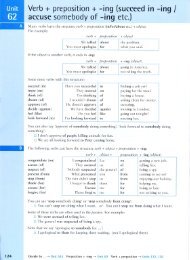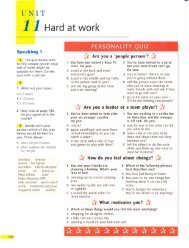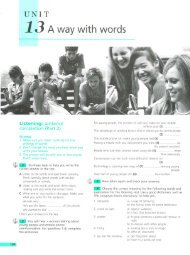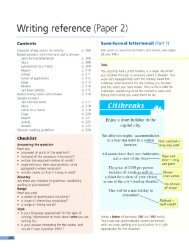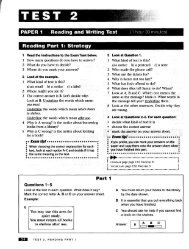I Vo.t are going to hear a news broadcast. Before you listen,look at ...
I Vo.t are going to hear a news broadcast. Before you listen,look at ...
I Vo.t are going to hear a news broadcast. Before you listen,look at ...
Create successful ePaper yourself
Turn your PDF publications into a flip-book with our unique Google optimized e-Paper software.
2 Expressing purpose<br />
(ln order) <strong>to</strong> + infinitive and so (th<strong>at</strong>) + verb<br />
In order <strong>to</strong>) <strong>to</strong>, so th<strong>at</strong> and so:<br />
o link an action and its purpose.<br />
So always goes in the middle of a sentence:<br />
I've been training every day so (th<strong>at</strong>) I'm really fit.<br />
In order <strong>to</strong> and ro go in the middle, or occasionally <strong>at</strong> the beginning, of a<br />
sentence:<br />
I'ue been training every day in ord.er <strong>to</strong> be really fit.<br />
I'ue been training every day <strong>to</strong> be really fit.<br />
To / In ord.er <strong>to</strong> be really fit, I've been taining euery day.<br />
In order <strong>to</strong> and so thet <strong>are</strong> stronger than <strong>to</strong> and so.<br />
A Sentences with so can sorpetimes have two meanings, for example:<br />
I'ue been training euery day so I'rn really fit.<br />
This could mean: I'ue been taining every day in ord.er <strong>to</strong> be really fit.<br />
or: I'ue been training euery day therefore I'm really fit.<br />
(>See Grammar, part 1.)<br />
1f, Remember, in sentences like these, we do not use jfor <strong>to</strong> express purpose:<br />
(not I'+'e heerc *eining every dq'fer be reelVfit.)<br />
3 Explaining cause and effect<br />
5o and such<br />
So and such mean 'as much as this'. We can use them <strong>to</strong> talk about cause<br />
and effect:<br />
He walLeed so slouly th<strong>at</strong> we arriued l<strong>at</strong>e. 1= we arrived l<strong>at</strong>e because of his<br />
slow walking speed)<br />
He was such a slow ualker th<strong>at</strong> we arriued l<strong>at</strong>e.<br />
We often omit th<strong>at</strong>, especially in speech:<br />
It was such an untiily office we couldn't find our books. = It was such an<br />
untidy office th<strong>at</strong> we couldn't find our booles.<br />
We can use so and such aftet because:<br />
Her teachers sent her home because she behaued so bailly.<br />
Her teachers sent her home because she was such a naughry chilil.<br />
So is followed by:<br />
r an adjective or an adverb:<br />
Her f<strong>at</strong>her is so rich th<strong>at</strong> she's neuer tauelled by bus<br />
He spolee <strong>to</strong> her so ruilely th<strong>at</strong> she walked out of the roorn.<br />
a the words rnany) much andfew, with or without a noun:<br />
He's inuited so meny people <strong>to</strong> the party there's nowhere <strong>to</strong> sit down.<br />
I'ue got so few books I can leeep them on one shelf.<br />
You cornplain so much th<strong>at</strong> everyone gets bored<br />
209


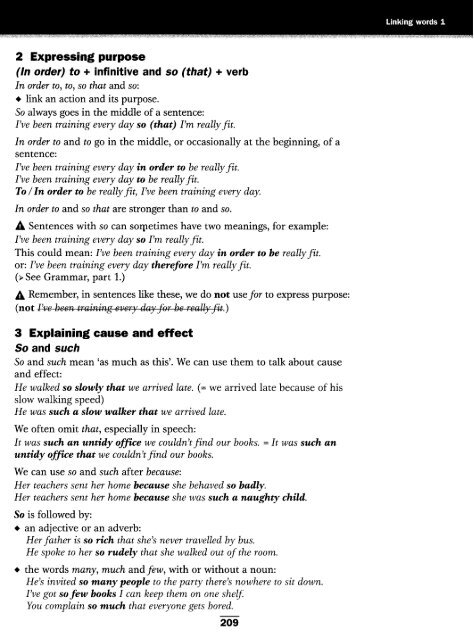
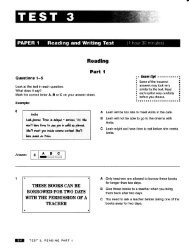
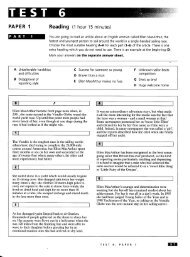
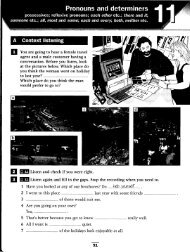
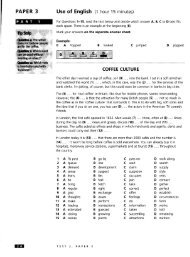
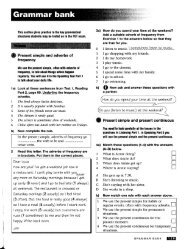
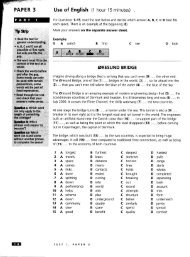
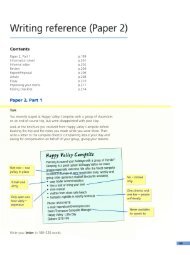

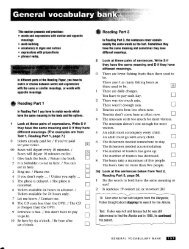
![T]NIT 9 A new look](https://img.yumpu.com/40125756/1/190x248/tnit-9-a-new-look.jpg?quality=85)
